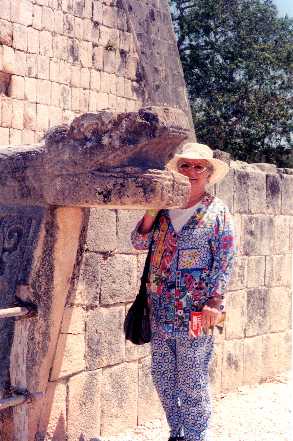[Spoiler alert]
First, the movie refers to the Native writing as Olmec and Proto-Zoquean--as if they're identical. They're not, but they’re related. In fact, the Zoque people are descendants of the Olmec, separated by about a millennium.
If we were trying to rationalize the movie, we could say Ben's father Patrick was imprecise when he called the writing Olmec. Ben's mother Emily seemed to agree with Patrick but actually corrected him. She didn't bother to explain that Proto-Zoquean isn't Olmec; it's only a derivative of Olmec.
The National Treasure: Book of Secrets goofs page relies too much on the single reference to Olmec. The writer(s) should've investigated the significance of the Proto-Zoquean reference. The best guess from this clue is that some Mesoamericans who spoke Proto-Zoquean in AD 600 was responsible for Cibola.
The lost city
The second clue comes from the lost city itself. From the pyramids to the snake-headed carvings, it resembles the Maya architecture of the Late Classic period. In particular, it resembles Chichén Itzá, a Yucatecan power from AD 600 to 1000. The Maya could've built the fictitious Cibola then or later. They could've done it after 1492, if you assume a "lost band" of Maya survived the European onslaught.
In short, the movie's information is ambiguous. The Indians could've been Olmec, Zoque, or Maya. In any case, if's fair to call them Mesoamericans.
For more on the subject, see The Best Indian Movies.
Below: Mom examines a snake head at Chichén Itzá resembling the one in National Treasure: Book of Secrets.


2 comments:
Mom must be in on the ancient conspiracy, then.
Does It Really Matter Anymore?
This lofty type of historical analysis would be absolutely lost upon a people who reek continuously of french fries and who passively allow a long-corrupt government to perpetually visit horrific ruin and desolation upon not only their lives, but the lives of their next several generations.
The next time there is another Katrina-like happening, I will but utter these words:
"Oh! Mother Earth. GO FOR IT!"
Post a Comment